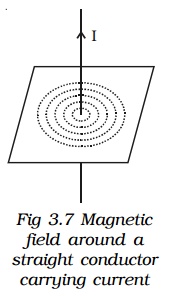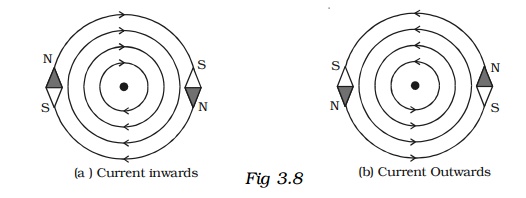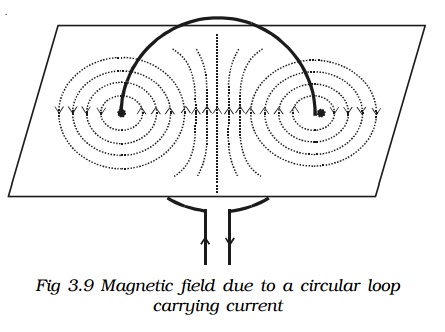Chapter: Physics : Effects of electric current : Higher Secondary(12 Std)
Magnetic effect of current
Magnetic effect of current
In 1820, Danish Physicist, Hans Christian Oersted observed that current through a wire caused a deflection in a nearby magnetic needle. This indicates that magnetic field is associated with a current carrying conductor.
1.Magnetic field around a straight conductor carrying current
A smooth cardboard with iron filings spread over it, is fixed in a horizontal plane with the help of a clamp. A straight wire passes through a hole made at the centre of the cardboard (Fig 3.7).

A current is passed through the wire by connecting its ends to a battery. When the cardboard is gently tapped, it is found that the iron filings arrange themselves along concentric circles. This clearly shows that magnetic field is developed around a current carrying conductor.
To find the direction of the magnetic field, let us imagine, a straight wire passes through the plane of the paper and perpendicular to it. When a compass needle is placed, it comes to rest in such a way that its axis is always tangential to a circular field around the conductor. When the current is inwards (Fig 3.8a) the direction of the magnetic field around the conductor looks clockwise.

When the direction of the current is reversed, that it is outwards, (Fig 3.8b) the direction of the magnetic pole of the compass needle also changes showing the reversal of the direction of the magnetic field. Now, it is anticlockwise around the conductor. This proves that the direction of the magnetic field also depends on the direction of the current in the conductor. This is given by Maxwell’s rule.
Maxwells’s right hand cork screw rule
If a right handed cork screw is rotated to advance along the direction of the current through a conductor, then the direction of rotation of the screw gives the direction of the magnetic lines of force around the conductor.
2.Magnetic field due to a circular loop carrying current
A cardboard is fixed in a horizontal plane. A circular loop of wire passes through two holes in the cardboard as shown in Fig 3.9. Iron filings are sprinkled over the cardboard. Current is passed through the loop and the carrying current card board is gently tapped. It is observed that the iron filings arrange themselves along the resultant magnetic field.

The magnetic lines of force are almost circular around the wire where it passes through the cardboard. At the centre of the loop, the line of force is almost straight and perpendicular to the plane of the circular loop.
Related Topics